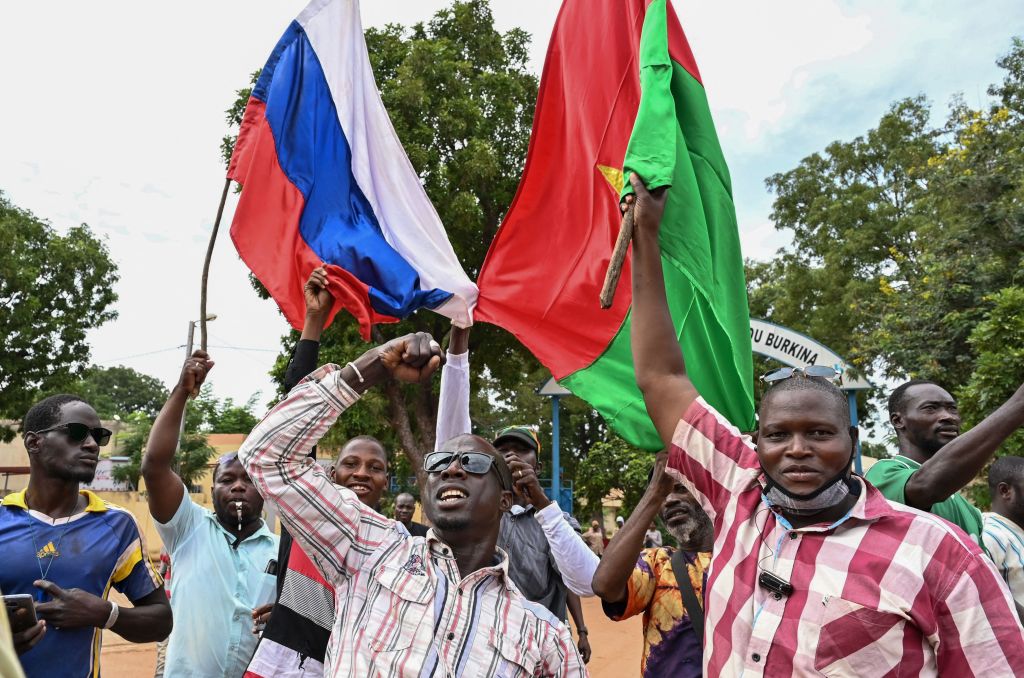ADF STAFF
After Burkina Faso’s second coup d’état on September 30, people took to the streets of Ouagadougou waving Russian flags. They gathered, in part, as a result of Russia’s relentless disinformation efforts, which paint Moscow as a counterterror ally. But they also revealed something deeper about Burkina Faso: The country is yearning for peace.
“The population is desperate to find some kind of a savior for the nation,” International Crisis Group’s Sahel Project Director Jean-Hervé Jezequel said in an October 7 podcast.
Experts warn that peace is unlikely to follow Russian involvement. There are signs that Russia might seize this opening for its Wagner Group mercenaries to set up shop in Burkina Faso, following a pattern it used in Mali after its two recent coups.
Burkina Faso’s continuing instability makes it an inviting target for the Wagner Group. The nation’s gold mines are coveted to further fund Russia’s war machine on the continent and in Ukraine.
When he seized power and addressed the nation after the most recent coup, Army Capt. Ibrahim Traoré hinted at working with Russian mercenaries but did not commit to it.
“The French have long been our partners,” he said in a televised news conference. “But we could have other partners now to support us. We are, in fact, in a partnership with Russia. We need to strengthen it.
“So, we can have several partnerships with all the powers that are willing to help us in this fight.”
Analyst Samuel Ramani, of the security think tank Royal United Services Institute, believes Traoré was trying to hedge his bets with Western countries and sees Wagner’s results in Mali as a cautionary tale.
“I think that Burkina Faso wants to avoid the trap that Mali got into,” Ramani told the BBC. “They’re now completely dependent and captured by the Russian state.”
Not only has the Wagner Group failed to deliver results in Mali, but its operatives also have been accused of crimes against humanity and civilian massacres, including the summary executions of 300 people in Mali’s Moura village.
“Wagner is good at creating chaos,” Ramani said. “But as a fighting force it struggles, particularly in new and hostile terrain.”
Jezequel said Wagner’s track record in Mali reveals that it is unlikely to improve security in Burkina Faso.
“There are serious limitations, huge shortcomings in the capacity of the Russians,” he said. “I don’t think that so far, the alliance with Russia has given any strategic advantages to the Malian government.”
The price tag of Wagner Group involvement in a country tends to be isolation on the world stage, civilian casualties and the loss of natural resources.
“Once the Russians come into these theaters, they can’t get them out,” Ramani said. “The same thing happened in the Central African Republic.”
While Traoré weighs his options in seeking foreign partners, experts say the Burkinabe have been led to their pro-Russia, anti-France beliefs by an elaborate propaganda network operating in the Sahel.
“There’s no question that there’s a kind of Russian influence campaign going on in these countries that serves a number of purposes,” Cameron Hudson, of the Center for Strategic and International Studies, told Foreign Policy magazine. “It’s anti-establishment of those countries, so it’s weakening leadership in those countries.
“I think that’s where the Russians can gain a foothold … where there are these transitions going on, where in the political space everything’s up for grabs. It’s sort of a game of musical chairs, and the Russians are standing at the record player.”

